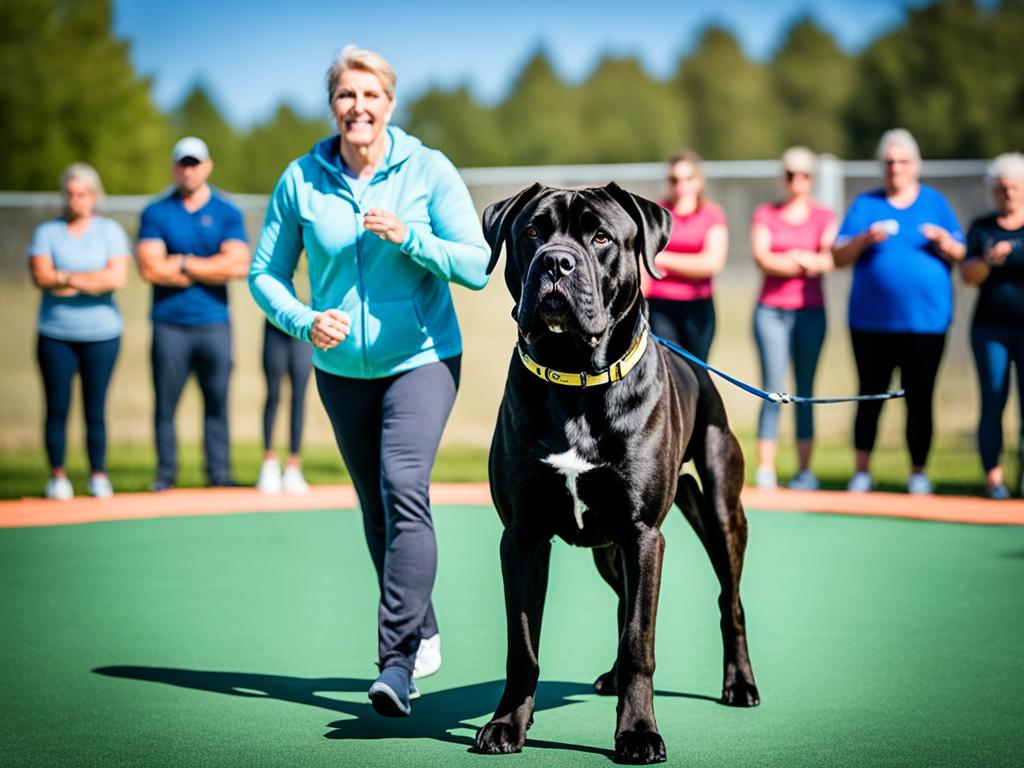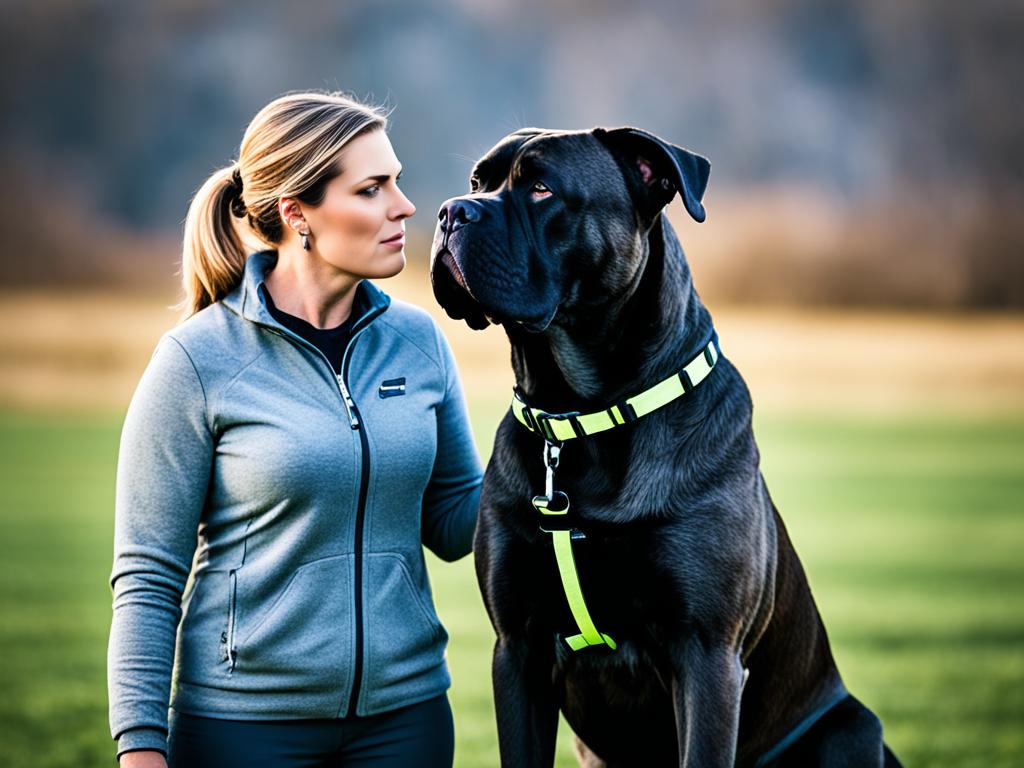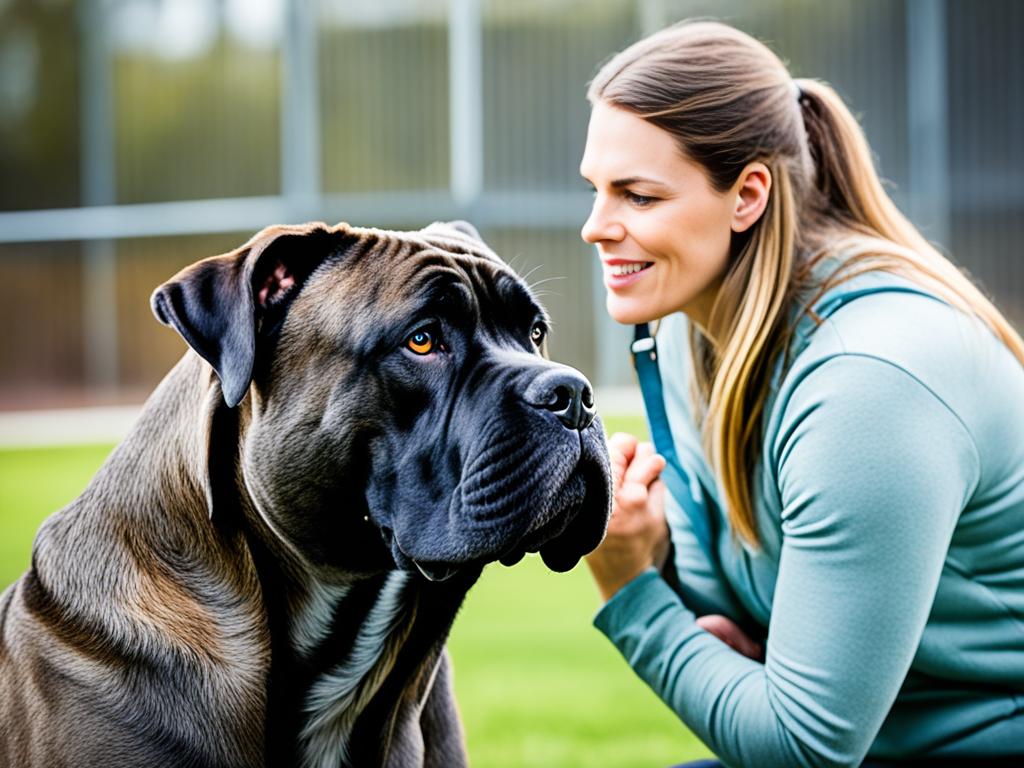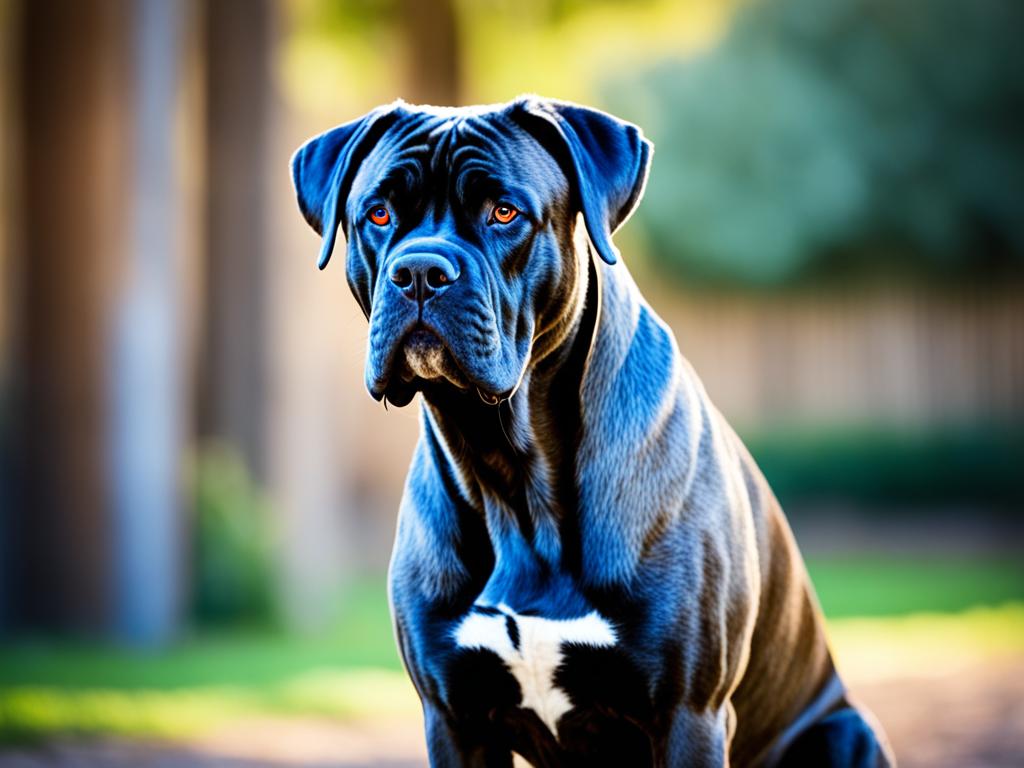Did you know that the Cane Corso, a breed known for its vigilant protection, can have a memory just as sharp and enduring for training cues as it does for faces and territories? This formidable breed’s ability to retain complex behavior patterns underscores the critical importance of meticulous Cane Corso behavior analysis in shaping a well-adjusted and obedient canine companion.
Understanding the Cane Corso behavior is key to harmonious living with these imposing animals. Proper Cane Corso temperament assessment can reveal the nuances in their personality, allowing owners to predict and manage their behavior effectively. Furthermore, a deep dive into Cane Corso personality evaluation offers insights into their individual quirks, aiding in crafting bespoke training strategies that align with their inherent traits. This article will take a closer look at the behavioral patterns of the Cane Corso to unravel the mysteries of their majestic demeanor.
Key Takeaways
- Early and consistent behavior analysis plays a vital role in raising a well-behaved Cane Corso.
- Understanding inherent traits through temperament assessment is essential for appropriate Cane Corso management.
- Personality evaluation helps tailor training approaches to suit each individual Cane Corso.
- Awareness of breed-specific behaviors is crucial for fostering a safe and nurturing environment.
- Education on Cane Corso behavior strengthens the bond between the dog and its owner.
Understanding the Cane Corso Temperament: What Makes Your Dog Tick
The Cane Corso brings a rich heritage that greatly influences its present-day behavior. Not merely a pet, the Cane Corso is a lineage holder of some of the most revered qualities in canine history, prominently driven by both their ancient occupations and natural drives. To truly grasp the behavioral characteristics of the Cane Corso, it’s essential to delve into the roles this breed has historically assumed and see how these traits have transitioned into their behavior in a modern setting.
Historical Roles and Natural Instincts
The Cane Corso is a descendant of Canis Pugnax, dogs that accompanied the Roman legions in their conquests. With a resume featuring roles such as war dogs, estate guardians, and big game hunters, these dogs were bred not just for their physical prowess but also for their mental fortitude. Such jobs required a vigilant, strong, and decisive canine—traits that shine through the breed today. The importance of understanding Cane Corso behavior can’t be overstated, as recognizing their instinctual backdrop is key to shaping a positive pet-owner relationship.
The Impact of Breed History on Modern Behavior
Modern Cane Corsos inherit a genetic legacy that continues to mold their personality. The breed’s native inclinations to guard and protect can manifest in various ways, from dutiful watchfulness over family members to demonstrations of territorial behavior. In assessing the behavioral characteristics of the Cane Corso, prospective and current owners must be cognizant of these intrinsic tendencies to guide their Corsos responsibly. With proper training and understanding, the protective nature of Cane Corsos can translate into a commendable ability to safeguard and serve rather than evolve into defensive aggression.
Moreover, the transition from historical utility to contemporary companionship hasn’t diluted the breed’s innate traits; it has merely repurposed them. In modern contexts, these behaviors require channeling through constructive training and lifelong learning, emphasizing the significance of acknowledging their past to inform their future.
Ultimately, the Cane Corso’s behavior is a tapestry woven from threads of a rich and powerful heritage. The key to unraveling and understanding this behavior lies in recognizing the fabric from which it is spun.
Early Training and Socialization: Paving the Way for a Balanced Cane Corso
Embarking on the journey of Cane Corso training tips and behavioral modification begins with the foundational steps of early training and socialization. This proactive approach is essential for nurturing a well-mannered and confident Cane Corso capable of coping with diverse environments and situations.
Starting Training at the Right Age
The formative weeks of a Cane Corso’s life are vital to their development. Commencing training during the puppy stage, specifically around 8 to 10 weeks, is a golden window of opportunity for owners to set the stage for their dog’s long-term demeanor and obedience. At this stage, the young Cane Corso’s brain is in an optimal state for receiving and retaining new information, making it the perfect time to introduce basic commands and positive interaction.
The Lifelong Benefits of Early Socialization
Just as crucial as early training, the process of early socialization equips a Cane Corso to approach the world with confidence rather than caution. This period is integral for preventing future behavioral issues, such as aggression or fear-based reactions, and for ensuring that your Cane Corso remains composed and disciplined in various contexts. A socialization checklist typically includes exposure to different people, pets, environments, sounds, and experiences.
Integrating a variety of interactions during a Cane Corso’s early stage not only fosters adaptability but also promotes a sense of security within them. They learn to discern what is normal, which inevitably aids in behavioral modification as they mature. A well-socialized Cane Corso becomes a testament to the effectiveness of early exposure and the profound impact it has on their future as a companion.
Proper and persistent adherence to these training and socialization steps ensures that a Cane Corso grows into a balanced individual, seamlessly blending their natural protective instincts with a stable and approachable temperament. For those investing in the future of their Cane Corso, the rewards of this diligent early training and socialization are indeed priceless.

Identifying and Managing Aggressive Tendencies in Cane Corsos
Aggression can be a significant concern when it comes to Cane Corso behavior issues. These majestic canines may exhibit Cane Corso behavior problems stemming from their instinctual protective drive coupled with a possible lack of targeted training. Recognizing the first signs of aggression—such as growling, rigid body posture, or snapping—is key to managing these tendencies before they escalate. An essential component of aggression management in Cane Corsos is seeking the expertise of professional trainers who are well-versed in the breed’s specific needs.
To address these concerns, it’s important to understand the triggers behind aggressive behavior in Cane Corsos. This often includes scenarios that make the dog uncomfortable or threatened. Through a combination of behavioral modification and consistent, patience-oriented training techniques, owners can help their Cane Corsos learn to respond to these triggers in a calm and non-aggressive manner.
| Behavioral Sign | Possible Trigger | Suggested Management Technique |
|---|---|---|
| Unwarranted growling | Perceived threat to territory | Positive reinforcement to associate non-aggression with rewards |
| Snapping at other dogs or people | Poor socialization or fear | Controlled exposure to social situations with professional oversight |
| Baring teeth | Attempt to assert dominance | Consistent leadership and obedience training |
| Stiffening body posture | Unexpected disturbance or new environment | Desensitization techniques to reduce sensitivity to changes |
These management techniques require dedication and a commitment to ongoing training. Owners should note that the journey towards correcting Cane Corso behavior problems, particularly aggression, is often gradual and should be approached with a mindset of understanding and consistency. Collaborating with professionals who specialize in Cane Corso behavior issues can provide both the dog and the owner with the tools necessary for a harmonious relationship. The overarching goal is to foster an environment where the Cane Corso feels secure and understood, thereby minimizing the need for aggressive responses.
Building a Leadership Role: How to Be the Alpha Your Cane Corso Needs
When it comes to understanding Cane Corso behavior, it’s imperative to realize the importance of the owner assuming a strong leadership role. This breed thrives under guidance that is both firm and loving. Establishing yourself as a pack leader doesn’t mean using intimidation; instead, it involves a combination of respect, consistency, and positive reinforcement to develop a stable foundation for your Cane Corso’s temperament.

Establishing Dominance with Positive Reinforcement
Positive reinforcement is integral in creating a safe and effective dominance dynamic between you and your Cane Corso. This approach to training stands in stark contrast to punishment-based methods, focusing instead on rewarding good behavior to reinforce the desired conduct. The outcomes can be significantly beneficial, and they extend to all aspects of Cane Corso temperament assessment and modification.
Crafting a Strong Owner-Dog Relationship
The owner-dog relationship with a Cane Corso is multi-dimensional. It requires balance, understanding, and the right strategies to flourish. By crafting the owner-dog relationship with care, owners can set the stage for a harmonious living environment, while improving their pet’s overall demeanor.
| Positive Reinforcement Technique | Behavior Encouraged | Assessment of Outcome |
|---|---|---|
| Verbal Praise | Obedience to Commands | Improved attentiveness and responsiveness |
| Treats | Calm Behavior in Stressful Situations | Reduced anxiety and increased trust in owner |
| Play Time | Socialization | Increased sociability and friendly interactions |
| Clicker Training | Precision in Following Commands | Sharper command recognition and execution |
Cane Corso Behavior Analysis: Interpreting Canine Signals and Actions

Understanding the behavior of a Cane Corso is pivotal to establishing a harmonious relationship between the dog and its owner. Cane Corso behavior analysis plays a critical role in identifying the various signals and actions that can indicate different emotional states. This insight is vital for effective Cane Corso behavior modification, allowing owners and trainers to implement the appropriate training strategies that align with the breed’s temperament.
Behavioral cues manifest in several forms, ranging from the Cane Corso’s posture to its vocalizations. Observing the subtleties in these cues is a skill that can reveal much about the dog’s mindset and help preemptively address issues before they escalate.
- Excessive barking or growling can indicate protective instincts or unease in certain situations.
- A tucked tail and pulled back ears may suggest fear or anxiety.
- Relaxed body language and a wagging tail usually signify a content and comfortable Cane Corso.
Deciphering these signals accurately is essential for modifying behavior in a way that’s conducive to both the dog’s well-being and the safety of its environment. Professional trainers often emphasize the need for a well-rounded approach to Cane Corso behavior modification, one that is customized to each dog’s personal experiences and inherent drives.
Another aspect to consider is the breed’s response to various stimuli. Cane Corsos may react differently to strangers entering the home compared to meeting new dogs at the park. Therefore, behavioral modification techniques must adapt to various contexts in which the Cane Corso interacts, ensuring it can handle stress positively and display socially acceptable behaviors.
Owners looking to delve deeper into Cane Corso behavior analysis should maintain detailed observations and consider consulting professionals who can provide guidance based on their understanding of the breed’s specific traits. It’s through this detailed analysis and thoughtful training that the noble Cane Corso can truly thrive within a family setting.
Health Checks: How Physical Well-being Influences Cane Corso Behavior
The robustness of the Cane Corso breed is an undeniable aspect of its appeal. Yet, it’s crucial for owners to understand that the physical health of their Cane Corso may have profound bearings on its behavior. Often, the intricate link between Cane Corso health and behavior is overlooked, but understanding the effect of physical health on behavior is key to ensuring both the psychological and physical wellbeing of these majestic animals.
The Importance of Regular Vet Visits
Regular veterinary check-ups stand as the first line of defense in identifying potential health issues that can influence the behavior of your Cane Corso. From diagnostics to preventative care, these visits help ensure that any medical complications that might lead to behavioral changes are addressed promptly. It’s through meticulous health monitoring that we can maintain the adaptability and composed nature that Cane Corsos are praised for.
Nutrition’s Role in Behavioral Issues
The effect of diet on temperament cannot be overstated. A balanced diet tailored to the needs of the Cane Corso contributes significantly to their steady and calm demeanor. When nutritional needs are not met, it may lead to an uptick in behavioral issues such as irritability or anxiety. Ensuring that your Cane Corso has access to the full spectrum of necessary nutrients is as much about their mental conditioning as it is about their awe-inspiring physical presence.
- Regular vet checks to catch health issues early
- Appropriate nutrition for optimal physical and mental health
- Observing changes in behavior as indicators for possible health problems
Exercise and Its Effect on Cane Corso Behavior
Understanding the impact of exercise on behavior is essential for the effective Cane Corso behavior management. Considering their muscular build and historical roles requiring high levels of physical activity, Cane Corsos thrive on engaging exercise routines to regulate their temperament and maintain amiable behavior. Without sufficient outlets for their energy, these robust dogs can exhibit problematic behaviors that strain the owner-dog relationship.
In the absence of regular physical activity, a Cane Corso may direct its energy towards unwanted behaviors such as destructive chewing, digging, or even unwarranted aggression. To curtail these tendencies, consistent and varied exercise regimens are recommended. Here’s an outline of exercising practices that have a favorable impact on behavior:
- Daily walks to provide both physical exertion and mental stimulation
- Tug-of-war as a controlled game to satisfy the breed’s instinctual urge to pull and exert strength
- Agility training which offers structured physical challenges and fortifies obedience
- Swimming, an excellent low-impact workout that enhances muscle tone while being gentle on the joints
- Fetch games that exercise both the body and the mind through retrieving tasks
Implementing such activities can pave the way for a balanced and well-adjusted Cane Corso. Both the quantity and quality of exercise play pivotal roles in ensuring the Cane Corso expends energy in a positive manner, offering an enriched life and fostering a harmonious living environment.
Furthermore, the exercise impact on behavior extends to improving the overall health of the canine, reducing incidences of obesity, and increasing their lifespan. A Cane Corso with a well-structured exercise routine is not only fit physically but is also endowed with a serene disposition.
With the right approach to physical activity, Cane Corsos can become well-behaved family members, loyal protectors, and joyous companions. It is, therefore, integral for owners to incorporate ample and varied exercise into their Cane Corso’s daily regimen for positive behavior outcomes.
Advanced Training Strategies for Behavioral Issues in Cane Corsos
As noble as they are formidable, Cane Corsos can present unique challenges that call for specialized approaches in behavior training. While basic obedience training is beneficial, certain behavioral concerns may persist, necessitating advanced Cane Corso training strategies. Such techniques are not one-size-fits-all; they should be adeptly aligned with the dog’s distinct temperament and behavioral patterns. Mastery of these advanced techniques can help modify negative behaviors effectively, leading to a more harmonious relationship between dog and owner.
Behavioral Modification Techniques
Cane Corso behavior modification techniques go beyond simple commands and corrections. They encompass a series of structured interventions that aim at altering the dog’s reactive behavior. Desensitization gradually exposes the dog to stimuli that trigger unwanted behaviors, reducing their impact over time. Counter-conditioning, on the other hand, aims to change the dog’s emotional response to triggering situations. These sophisticated methods require patience and consistency but are instrumental in adjusting a Cane Corso’s behavior in a positive direction.
Tailoring Training to Your Dog’s Personality
The efficacy of personalized Cane Corso training cannot be overstated. By tailoring training strategies to cater to an individual dog’s personality and quirks, owners and trainers can unlock the full potential of their Cane Corsos. Trainers adept in managing powerful breeds like the Cane Corso can design a custom training regimen that considers the dog’s past behavioral history and inherent characteristics. This approach not only encourages positive behavioral outcomes but also fosters a deeper understanding and a stronger bond between the canine and its human companion.
FAQ
What are common behaviors to expect from my Cane Corso?
Cane Corsos are known for their protective nature, loyalty, and assertiveness. They may show wariness towards strangers and a strong instinctive urge to guard their family and territory. With their large size and energy, they can inadvertently display aggressive behaviors without proper training and socialization. Understanding and channeling their natural instincts is crucial for nurturing a well-behaved canine companion.
How do historical roles of the breed affect Cane Corso behavior today?
The Cane Corso’s ancestors were utilized as war dogs, guardians, and hunters, which has shaped their protective and loyal temperament. These roles have equipped the breed with instincts to protect and serve, often resulting in a noble and courageous demeanor when properly trained, or potentially problematic aggression if mistrained or misunderstood.
At what age should I start training my Cane Corso, and why is it important?
It is advised to initiate training during the early puppy stages, around 8 to 10 weeks old. During this formative period, Cane Corsos are particularly receptive to bonding and learning fundamental commands. Early socialization helps prevent aggression, stubbornness, or fear responses, setting the foundation for a well-adjusted adult dog.
How can one manage aggressive tendencies in Cane Corsos?
Aggression can be managed by recognizing early signs and implementing corrective training strategies. Getting assistance from trainers who specialize in the breed is essential. They should use positive reinforcement and patience to shape desired behaviors and mitigate aggressive tendencies effectively.
What are key strategies for establishing myself as the pack leader to my Cane Corso?
To establish yourself as the pack leader, consistently use positive reinforcement techniques, set clear boundaries, and maintain a calm yet assertive demeanor. This will foster trust and encourage voluntary adherence to commands, helping to create a stable environment and a strong bond with your Cane Corso.
How can pet owners analyze and understand Cane Corso behavior signals?
Understanding Cane Corso behavior involves a deep knowledge of canine body language and signals. Observing your dog’s actions and reactions in different contexts can give insights into their emotional and psychological states. Recognizing their cues for stress, excitement, or aggression allows for effective intervention and tailored training approaches.
What role does physical health play in my Cane Corso’s behavior?
Physical well-being is significantly tied to a Cane Corso’s behavior. Issues such as pain, discomfort, or nutritional deficiencies can lead to behavioral changes like increased aggression or anxiety. Regular vet check-ups and a balanced diet are crucial for maintaining both physical and behavioral health.
How does exercise influence my Cane Corso’s behavior?
Regular and appropriate exercise is vital for channeling a Cane Corso’s energy constructively and maintaining balanced behavior. Insufficient physical activity can result in destructive behavior or increased aggressiveness. Exercise routines should cater to their natural instincts and abilities for the best behavioral outcome.
What advanced training strategies are effective for behavioral issues in Cane Corsos?
Advanced training strategies suitable for Cane Corsos with behavioral issues include desensitization, counter-conditioning, and personalized training methods. These methods aim to change the dog’s response to various stimuli and should be adapted to each dog’s unique personality and circumstances for best results.

Leave a Reply